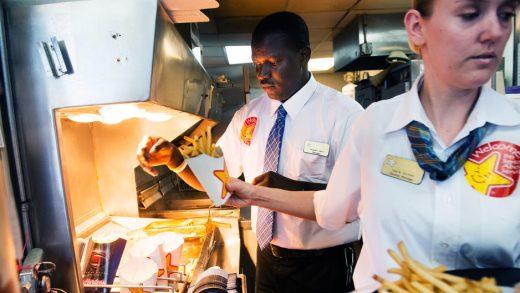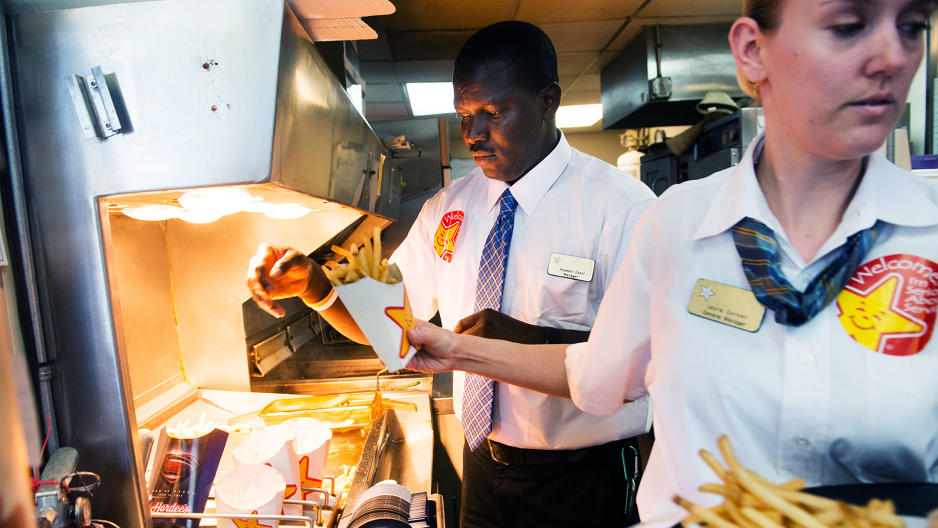What It Was Really Like To Work At Labor Nominee Puzder’s Fast Food Empire
Capital & Main is an award-winning publication that reports from California on economic, political, and social issues.
President Trump’s nominee to lead the Labor Department, Andrew Puzder, admitted this week that he employed an undocumented housekeeper for years. But those revelations didn’t derail the fast-food CEO’s nomination—he is still strongly supported by the White House and his confirmation hearing could come as soon as next week. In that role, Puzder’s job will be to oversee America’s job market and to enforce rules on workplace safety and discrimination and employer-provided benefits.
Since 2000, Puzder has been the CEO of CKE Restaurants, where he employs 70,000 workers at Carl’s Jr. and Hardee’s restaurants. The 66-year-old attorney helped legendary Carl’s Jr. founder Carl Karcher out of legal and financial jams in the 1980s and ’90s. The two grew close and he eventually took the reins as CEO of the fast-food empire. A free-market advocate, he believes that job growth is being suffocated by regulation and he vigorously opposes overtime rules, federal sick pay regulations, and Obamacare. Puzder contributed nearly $700,000 to the Trump campaign and has been praised by the president for “fighting for workers.”
Puzder commands the loyalty of some top managers but not the affection that many of his employees felt for Karcher. A hard-driving boss, he has called his workers the “best of the worst” of the American workforce, and once said of his store managers, that “you’re lucky if they have a high school diploma.” Some employees, from line workers to upper-level managers, are bitter about the company’s employment practices and question his fitness to serve as the nation’s top labor official.
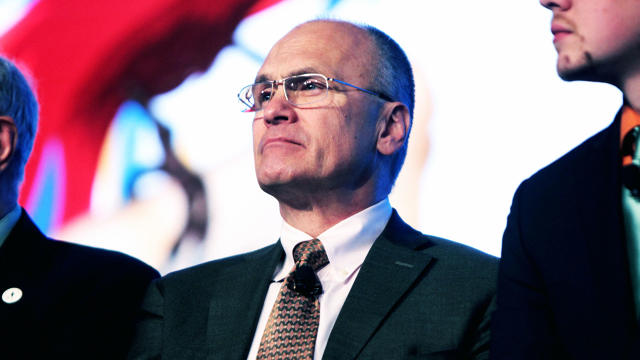
Former employees and one current worker—some of whom spoke to Capital & Main on condition of anonymity, cited the disinterest and even disdain they said he showed for his own workers. They describe him as smart, articulate, and competent—but also as cutthroat, fostering an atmosphere at corporate headquarters where backstabbing is common and camaraderie is rare. (Puzder did not respond to interview requests for this article.) It’s a description that might fit more than a few contemporary CEOs, but in Puzder’s case the stakes are much higher because this particular CEO could soon run a vast federal bureaucracy that is responsible for the well-being of American workers. Puzder’s critics fear that as CKE goes, so will the Department of Labor.
If he were nominated for any other post, Puzder’s accomplishments in business and his lifelong interest in public policy might have outshone the indifference with which his own employees say he treats them. But as nominee for secretary of labor, Puzder’s track record as an employer is front and center, and that’s why, some workers say, they’ve chosen to share their experiences, despite their doubts and fears about doing so publicly.
A manager who currently works at the company and fears he’ll be fired if he gives his name, recalled Puzder’s visits to Hardee’s in the early 2000s, when the CEO was looking to boost sales at the then-troubled brand. “People would shake in their shoes as he came in,” the manager said. “He was very rude…If you were a white, blond cashier, you were doing a great job. If you were an overweight person, it was highly recommended that we try to get rid of you. We were trying to change our image at the time.”
In 2011, Puzder told a reporter at National Restaurant News that during the Hardee’s turnaround he issued a memo saying “no more people behind the counter unless they have all their teeth.” The company got into legal trouble because of its image-consciousness in 2005, when it settled a lawsuit with the federal Equal Employment Opportunity Commission on behalf of a woman with facial deformities who said she’d been denied a job at Hardee’s while other similarly qualified people were hired.
One former department director at the company’s Carpinteria, California offices, who signed an agreement not to speak publicly about CKE when she left her job, and who asked not to be named, confirms that Puzder is highly image-conscious and sometimes puts his own fiercely partisan political interests ahead of the company’s. She said her willingness to speak up didn’t sit well with Puzder. She describes staff members painstakingly polishing her boss’s op-eds and watching him spend tens of thousands of dollars to spruce up a Southern California Carl’s Jr. ahead of a campaign stop by then-presidential candidate Mitt Romney, who Puzder backed in 2012.
LaTonya Smith, a former manager-in-training at a Hardee’s restaurant in Birmingham, Alabama, describes working 100-hour weeks, scrubbing and polishing to perfect her restaurant’s health department rating, only to lose her job when she told her manager she had to leave work early for an emergency medical appointment for her spiking blood pressure. “They don’t give women a chance,” Smith told Capital & Main.
Smith filed a complaint about her dismissal with the federal Equal Employment Opportunity Commission that claimed, “Hardee’s is a largely male-dominated culture through the supervisor ranks and physically demanding…Women employees are viewed as being less strong than male employees.” She ultimately sued Hardee’s for race and gender discrimination and settled for an undisclosed amount.
Dozens of employee lawsuits and complaints filed with federal and state agencies similarly describe a male-dominated workplace where racial, gender, and age discrimination, along with sexual harassment, are tolerated, but reporting those abuses is not. In court documents and interviews, workers allege that reporting discrimination has caused the company to retaliate against them, and has cost some employees promotions, or even their jobs.
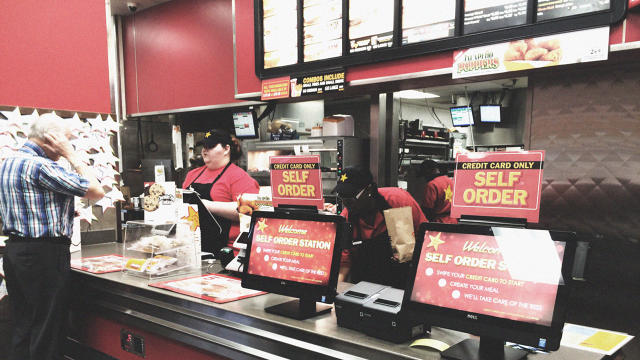
Interviews with management employees, most of whom have left CKE, reveal a company where even higher-level workers are dispensable. The former department director who worked with Puzder in Carpinteria said, “It was shut up, keep your head down, and be happy you have a job.” Former manager Ron Suckle, who worked in risk management at the Carpinteria offices, said CKE’s company culture came from Puzder: “On the executive level of CKE, it was a boy’s club, a white boy’s club. He basically treated the employees like chattel.”
The company’s nine-member executive management team is all-male. Among its corporate peers—the nine U.S. burger chains with $1 billion or more in annual sales—it is one of only three companies with an all-male executive management team. The team consists of a single person of color, chief operations officer Eric Williams, who is African–American.
While CKE’s competitors are far from achieving gender and racial equality in their top ranks, some have made more progress than CKE in diversifying their leadership. Sonic Drive-In, which is about the same size as CKE, also includes nine executive managers, four of whom are women. McDonald’s lists 16 top executives, among them seven women. At Jack in the Box, four of the 12 highest-ranking executives are women; two are non-white. Wendy’s and Burger King’s executive teams also include female leaders. Only the company’s smaller competitors are completely led by men. Capital & Main couldn’t immediately confirm the ethnic makeup of top executives at most burger companies that compete with CKE.
“The diversity of a management team is a good indicator of diversity at all levels of a company,” said Jennifer Chatman, a professor of management at the Haas School of Business at the University of California, Berkeley. “If there are women and racial minority members at the highest level of the company, it means that the company has made an effort to hire, develop, and promote people who are not members of our society’s historically dominant and high-status group—white men.” The racy TV commercials don’t help matters, Chatman said. Carl’s Jr.’s include the innuendo-heavy three-way bacon burger spot, which shows a trio of nearly identical blond models in bikinis lustily feeding each other strips of bacon as they tout the “three-way.”
“Leaders looking for justification for why they should hire or treat people differently based on gender would find support based on this ad campaign,” Chatman said. “[The ads] give people in the organization clues about what the culture of the organization is—what’s likely to be rewarded, punished, and overlooked,” she said.
Puzder personally participated in auditioning models for the signature ads, said a former company vice-president who didn’t want her name used, and enjoyed being on the set during filming, the former department director told Capital & Main. Indeed, in 2015, he told Entrepreneur magazine that the brand aimed at young hungry guys reflected his own personality.
Still, Cathy Kellner-Diaz, a vice-president of international marketing, spoke enthusiastically about her work at the company, arguing that she and other women have enjoyed opportunities for advancement at CKE.
“I’m proud to be a woman in this organization,” Kellner-Diaz said. Puzder recruited her from an ad agency where they had worked together. “We’ve had a productive and successful relationship,” she said. “Andy brought me to CKE because I’d definitely achieved results. It was a great compliment.”
With Puzder’s confirmation facing an avalanche of opposition from labor and women’s groups, COO Williams penned an op-ed in Business Insider last week crediting the CEO with mentoring and helping him reach the top at CKE. Company spokesman George Thompson said that some 29% of vice-presidents are people of color, and a third are women. He cited several other individuals who started at the bottom and built rewarding careers at CKE, such as Enrique Delgado, a company vice president who began cleaning tables and serving food, and James Spear, an African-American man who started at the company 16 years ago as a crew member and now serves as vice president of operations.
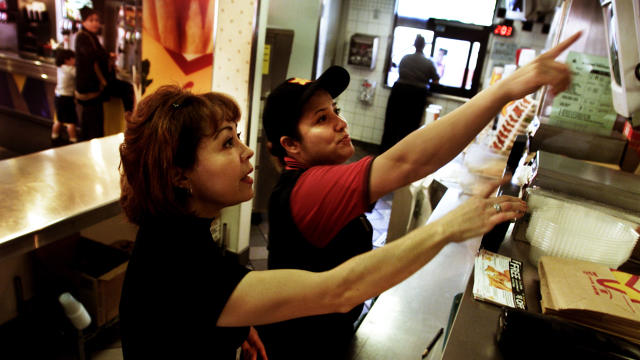
Notwithstanding such individual successes, men and women who have served in management in the company say the glass ceiling is firmly intact at CKE. Management’s lower ranks—the relatively low-paid restaurant managers and their supervising district managers, are majority women and people of color, but their numbers shrink significantly in upper management.
A former manager, who didn’t want her name published because she’s now an executive at another restaurant chain, said one reason it’s tough to move up in the company is that it offers no clear path to advancement. “No one is investing in your professional development.” She added that there are no performance evaluations, and that bonuses are given at the company’s discretion, with no clear criteria for earning one.
“It’s sold to people as, ‘You might make more money,’ but it doesn’t work that way,” she said.
“I had to do a lot of pushing just to get a raise,” said the former department director who’d agreed not to speak publicly against CKE Restaurants. It was tough to advocate for herself, she said. “If you went to HR [human resources], you were a troublemaker. You wouldn’t be invited to meetings—or I wouldn’t be.”
“Certainly, having clear criteria for what makes you promotable and what constitutes justification for raises are bread-and-butter practices,” Jennifer Chatman said. “The less codified and clear the criteria are, the more there’s potential for inequities to occur. That’s Organizational Behavior 101.”
A company spokeswoman did not answer questions about the company’s policies on performance evaluations, job postings, or bonuses. Some companies, like McDonald’s, detail a commitment to diversity and programs to achieve it on their websites. When asked if CKE had a similar document, a spokesman responded that the company is committed to equal employment opportunity and follows anti-discrimination laws.
The same manager who recalled Puzder’s visits to Hardee’s also noted that the company encouraged discrimination in not so subtle ways. He said that if a restaurant’s clientele was half black and half white, a manager would be encouraged to hire workers that reflected that demographic mix. He said that higher-ups, not including Puzder, would sit down with a restaurant manager and ask her to look around the dining room. Then, they would ask her to look at her crew members. It wasn’t said out loud, but the people who ran the restaurants were led to believe that upper management wanted to hire workers that matched the racial makeup of a restaurant’s clientele.
It is unclear how widespread this practice was, but as Capital & Main has previously reported, two managers at different Hardee’s franchises in Alabama said in court documents that they were subject to similar policies. One alleged that a white manager was hired to replace her because her store’s customers were mostly white, and another manager said she was directed to hire white workers at restaurants where their customers were also mostly white.
Puzder’s confirmation has been postponed for a fourth time, at least in part because he has yet to submit any of the paperwork required of cabinet nominees. If he does make it to his confirmation hearings, some of his workers—past and present—will watch the proceedings with trepidation.
“He’s the antithesis of someone who should be labor secretary,” Ron Suckle said. “He’s anti-labor. He basically believes workers should be used and not nurtured.”
Fast Company , Read Full Story
(27)

